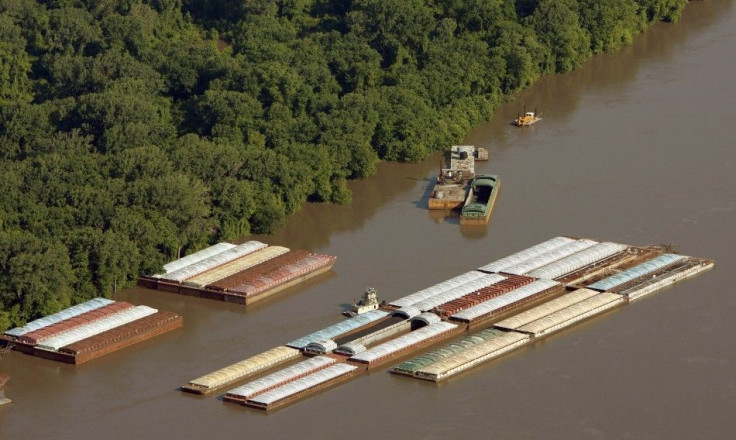Barges Back Up On Drought-Lowered Mississippi
Another possible effect of low river level: salt in New Orleans drinking water

Mississippi River traffic halted again Wednesday due to a grounded barge near Greenville, Miss., as the nation's main waterway falls toward a record low level because of the worst U.S. drought in over a half century.
"We're in the low-water season to begin with, but the lack of rain, drought, no snow up north this past winter, all that accumulation of water that trickles down is just not there and is exacerbating the situation," said Tommy Hart, director of the Port of Greenville where approximately 100 barges have been waiting nearby to pass through a bottleneck in river traffic.
The U.S. Coast Guard says about 33 of these barges were allowed to pass through after the U.S. Corps of Engineers dredged enough of a channel to resume traffic. Greenville is about halfway between Vicksburg and Memphis, Tenn., the worst-affect stretch of the Mississippi.
But the going is slow and barges cannot carry as much cargo as they normally could, which raises the cost of delivering goods that depend on the river as transport. Approximately 60 percent of the nation's grain and a fifth of its coal is moved on the country's waterways, according to American Waterways Operators, a 350-member trade group based in Arlington, Va. Most of that cargo spends at least part of its journey on the 2,500-mile long -- and lately -- slow-moving Mississippi.
For corn farmers near Greenville, the river bottleneck has backed up harvest operations, according to Cary Karlson, executive director of the local Delta Economic Development Center, which advocates for local businesses in Washington County, Miss.
"The load up problem right now is we've got corn that's being harvested and it's going both north and south," said Karlson. "So they can't put as many barges into the river and can't put as much weight on the barges."
That means corn grown in Mississippi and Arkansas -- crops that were spared the brunt of this year's drought that battered the Midwest Corn Belt -- is more expensive to send up or down the river.
Greenville is home to a facility owned by McClean, Va.-based Mars Inc., which produces Uncle Ben's rice brand products for the North American market. A representative for privately held Mars said he was not aware of any interruption at the factory due to the problems on the river. Typically commodities are shipped by river, a slower but less costly process, while products for delivery to end consumers at grocery stores are delivered by trucks.
"Barges move slowly at best. It's the most economical form of transportation," said Hart. "It stops being so when you have to reduce the quantity that can be carried on a barge. We're down about 25 percent in cargo capacity we can normally load. That increases the cost of the balance. It's gotta go, so they're just light loading and continuing to ship."
Hart said the last time he witnessed such a back-up of barge traffic was in 1988, when the Mississippi water level at Memphis was at a record of 10.7 feet below the seasonal average. As of Wednesday, the same National Weather Service station reported water levels at 9.1 feet below average. By Monday that level is expect to be at 9.8 feet below average.
So will we see another major slowdown like we saw in 1988? Hart, who said he was in Greenville back then, doesn't think so since the U.S. Corps of Engineers has improved the conditions on the river. He said a bigger and ongoing issue for Mississippi ports is channel entrances into harbors.
"That dredging has to be performed regularly," he said. "The river's depth is in pretty good shape. We can ship full loads if we can simply get the barges into the river."
According to American Waterways Operators every foot of draft (the distance between the bottom of a barge and the surface of the water) represents 204 tons of cargo. When river levels are low enough, as they are now, barges must reduce their draft by lightening their load. A typical lower Mississippi River tow -- that's industry speak for a tugboat and the numerous barges it pushes and steers -- is comprised of 30 to 45 barges. Reducing the draft of all of the vessels in that tow represents 9,000 tons less cargo capacity.
"This would be the equivalent of adding 130 tractor-trailer trucks to the highways or 570 rail cars on the rail system for just one large tow," said Tom Allegretti, head of the AWO in a statement last month regarding growing concerns over the drought's effect on the nation's most important waterway.
Meanwhile, the river's low level is creating another problem. In New Orleans the U.S. Corps of Engineers is working to keep saltwater from polluting the city's drinking water. The low tide and weaker flow of freshwater in the Mississippi is causing the heavier salt water from the Gulf of Mexico to eke its way upriver. Plaquemines Parish, south of New Orleans, is already grappling with the problem.
Earlier this month, Louisiana declared a state of emergency in Plaquemines Parish south of New Orleans after Red Drum were seen in the river and saltwater began invading freshwater intakes. Parish residents have been drinking from water-laden barges for the past couple of weeks.
© Copyright IBTimes 2024. All rights reserved.






















